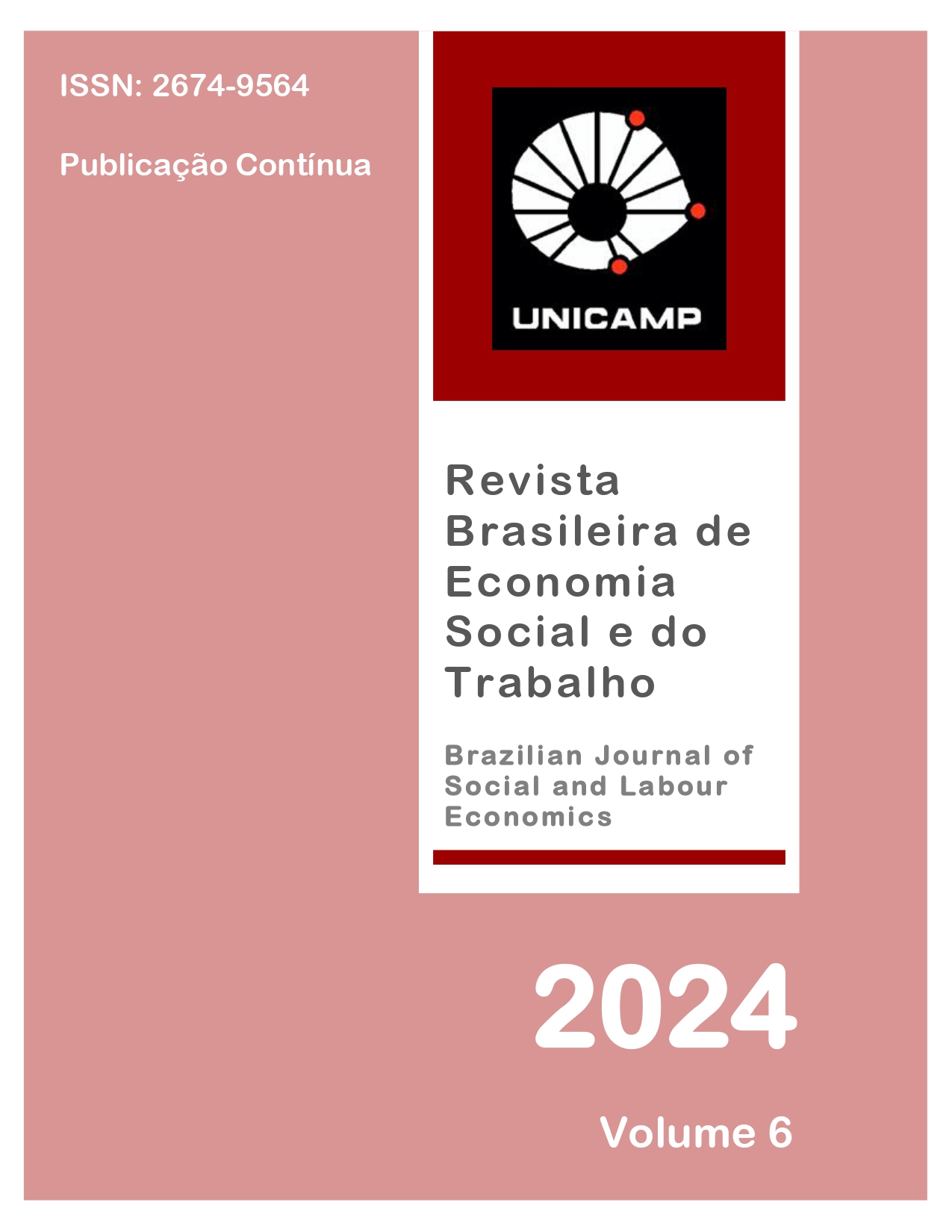Abstract
The purpose of this article is to analyze the evolution of four labor market indicators included in Sustainable Development Goal no. 8 for the Brazilian states between 2016 and 2021. The predominant trend in the states was an increase in the proportion of informally employed, the unemployment rate and the proportion of young people not studying and not employed, and a reduction in real average hourly earnings. Among men, the deterioration was more widespread in the proportion of informal workers and in real average hourly earnings; among women, in the unemployment rate and in the proportion of young people not in education or employment. The k-means clustering method was applied to the SDG 8 indicators applied to state labor markets. When comparing 2016 with 2021, the average of three indicators – the proportion of informally employed, the unemployment rate and the proportion of young people who are not studying and are not employed – deteriorated in almost all groupings, with the sole exception of the Southern Region.
References
Baltar, P., & Leone, E. (2017). A recessão 2015-2016 e o mercado de trabalho no Brasil. In Anais do XV Encontro Nacional da Associação Brasileira de Estudos do Trabalho, ABET, Rio de Janeiro, Brasil. http://abet-trabalho.org.br/wp-content/uploads/2020/12/GT-11.pdf
Barbosa, A., Costa, J., & Hecksher, M. (2020). Mercado de trabalho e pandemia da Covid-19: ampliação de desigualdades já existentes? Mercado de Trabalho: Conjuntura e Análise, 26(69), 55-63. https://repositorio.ipea.gov.br/handle/11058/10291
Braga, D., Assunção, G., & Hidalgo, L. (2022). Package PNADcIBGE. Comprehensive R Archive Network. https://cran.r-project.org/web/packages/PNADcIBGE/index.html
Corseuil, C., Franca, M., Padilha, G., Ramos, L., & Russo, F. M. (2022). Comportamento do mercado de trabalho em duas recessões: análise do período 2015-2016 e da pandemia de covid-19. In S. Silva, C. Corseuil, & J. Costa (Orgs.), Impactos da pandemia de covid-19 no mercado de trabalho e na distribuição de renda no Brasil (pp. 23-40). IPEA. https://repositorio.ipea.gov.br/handle/11058/11561
Economic Comission for Latin America and the Caribbean (ECLAC) (2018). The 2030 Agenda and the Sustainable Development Goals: An opportunity for Latin America and the Caribbean. https://repositorio.cepal.org/items/1a875454-76d9-48fd-a4d2-a0d4526a4c96
Elder, S. (2015). What does NEETs mean and why is the concept so easily misinterpreted? [Technical Brief no. 1], Work4Youth, International Labour Office. https://www.ilo.org/wcmsp5/groups/public/---dgreports/---dcomm/documents/publication/wcms_343153.pdf
Giordani, P., Ferraro, M., & Martela, F. (2020). An introduction to clustering with R. Springer.
Gregory, M. (2009). Gender and economic inequality. In W. Salverda, B. Nolan, & T. Smeeding (Eds.), The Oxford handbook of economic inequality. OUP.
Hair, J., Black, W. C., Babin, B.J., Anderson, R.E., & Tatham, R.L. (2005). Análise multivariada de dados. Bookman.
Halkidi, M., Vazirgiannis, M., & Hennig, C. (2016). Method-independent indices for cluster validation and estimating the number of clusters. In C. Hennig, M. Meila, F. Murtagh, & R. Rocci (Eds.), Handbook of cluster analysis. CRC Press.
Hennig, C. (2023). Package fpc. Vienna: Comprehensive R Archive Network. https://cran.r-project.org/web/packages/fpc/index.html
Hennig, C., Meila, M., Murtagh, F., & Rocci, R. (Eds.) (2016). Handbook of cluster analysis. CRC Press.
Instituto Brasileiro de Geografia e Estatística (IBGE) (2021). Síntese de indicadores sociais – uma análise das condições de vida da população brasileira 2021. [Estudos & Pesquisas 44]. https://biblioteca.ibge.gov.br/visualizacao/livros/liv101892.pdf
Instituto Brasileiro de Geografia e Estatística (IBGE) (2022). Síntese de indicadores sociais – uma análise das condições de vida da população brasileira 2022. [Estudos & Pesquisas 49]. https://biblioteca.ibge.gov.br/visualizacao/livros/liv101979.pdf
Instituto Brasileiro de Geografia e Estatística (IBGE) (2023). Sistema de contas nacionais trimestrais. https://www.ibge.gov.br/estatisticas/economicas/contas-nacionais/9300-contas-nacionais-trimestrais.html?=&t=resultados
International Labour Organization (ILO) (2016a). ILO implementation plan: 2030 Agenda for Sustainable Development. https://www.ilo.org/wcmsp5/groups/public/---dgreports/---dcomm/---webdev/documents/publication/wcms_510122.pdf
International Labour Organization (ILO) (2016b). Key indicators of the labour market. https://www.ilo.org/wcmsp5/groups/public/---dgreports/---stat/documents/publication/wcms_498929.pdf
International Labour Organization (ILO) (2018). Women and men in the informal economy: a statistical picture. https://www.ilo.org/wcmsp5/groups/public/---dgreports/---dcomm/documents/publication/wcms_626831.pdf
International Labour Organization (ILO) (2020). ILO monitor: Covid-19 and the world of work (3rd ed.). https://www.ilo.org/wcmsp5/groups/public/---dgreports/---dcomm/documents/briefingnote/wcms_743146.pdf
International Labour Organization (ILO) (2022). Global employment trends for youth 2022. https://www.ilo.org/wcmsp5/groups/public/---dgreports/---dcomm/---publ/documents/publication/wcms_853329.pdf
James, G. (2021). Elements of statistical learning – with applications in R. Springer.
Lumley, T. (2021). Package survey. Comprehensive R Archive Network. https://cran.r-project.org/web/packages/survey/index.html
Maurizio, R. (2021). Empleo e informalidade en América Latina y el Caribe: una recuperación insuficiente y desigual. [Serie Panorama Laboral en América Latina y el Caribe], OIT. https://www.ilo.org/americas/publicaciones/WCMS_819022/lang--es/index.htm
Mirkin, B. (2005). Clustering for data mining – A recovery approach. CRC Press.
O’Higgins, N., Barford, A., Coutts, A., Elsheikhi, A., Caro, L. P., & Brockie, K. (2023). How NEET are developing in emerging economies? What do we know and what can be done about it? In Global Policy Review 2023 (pp. 53-81). International Labour Office. https://www.ilo.org/global/publications/WCMS_882222/lang--en/index.htm
Organización Internacional del Trabajo (OIT) (2020). Panorama Laboral 2020: América Latina y el Caribe. https://www.ilo.org/americas/publicaciones/WCMS_764630/lang--es/index.htm
Silva, E., & Vaz, F. (2022). Os jovens que não estudam e não trabalham no contexto da pandemia de covid-19 no Brasil. In S. Silva, C. Corseui, & J. Costa. (Orgs.), Impactos da pandemia de covid-19 no mercado de trabalho e na distribuição de renda no Brasil (pp. 335-354). IPEA. https://repositorio.ipea.gov.br/handle/11058/11561
Tokman, V. (2004). Una voz en el caminho: empleo y equidad en América Latina (40 años de búsqueda). Fondo de Cultura Económica.
United Nations (2016). Report of the inter-agency and expert group on sustainable development goal indicators. https://digitallibrary.un.org/record/821651?v=pdf
United Nations (2022a). The Sustainable Development Goals Report 2022. https://unstats.un.org/sdgs/report/2022/The-Sustainable-Development-Goals-Report-2022.pdf
United Nations (2022b). Decent work and economic growth: The sustainable development goals extended report 2022. https://unstats.un.org/sdgs/report/2022/extended-report/Extended-Report_Goal-8.pdf
Weller, J., Gómez Contreras, M., Martín Caballero, A., & Ravest Tropa, J. (2020). El impacto de la crisis sanitaria del COVID-19 en los mercados laborales latinoamericanos. [Documentos de Proyectos, n. 2020/90], CEPAL. https://www.cepal.org/es/publicaciones/45864-impacto-la-crisis-sanitaria-covid-19-mercados-laborales-latinoamericanos

This work is licensed under a Creative Commons Attribution-NonCommercial-ShareAlike 4.0 International License.
Copyright (c) 2024 Raul Luís Assumpção Bastos


